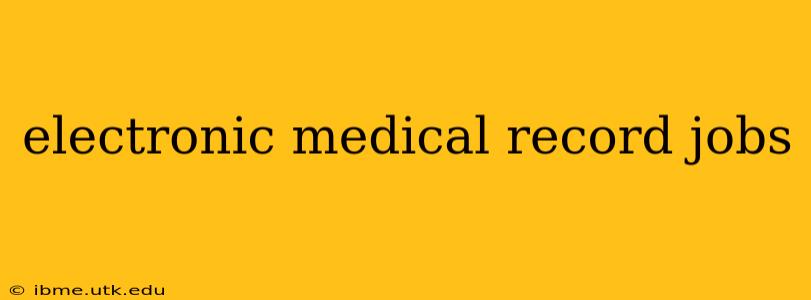The healthcare industry's increasing reliance on electronic medical records (EMRs) has created a surge in demand for skilled professionals. This guide explores the diverse range of EMR jobs available, the required skills, and the career paths you can pursue in this rapidly evolving field.
What are the Different Types of EMR Jobs?
The world of EMR jobs isn't limited to just one role. The field encompasses a wide spectrum of specializations, each demanding unique skill sets. Here are some prominent examples:
-
EMR/EHR Implementation Specialist: These professionals are crucial in the process of installing, configuring, and integrating new EMR systems within healthcare organizations. They work closely with IT departments and clinical staff to ensure a smooth transition.
-
EMR/EHR Trainer: Training staff on how to effectively use the new EMR system is vital for successful adoption. These trainers provide hands-on instruction, create training materials, and offer ongoing support to users.
-
EMR/EHR Analyst: These professionals analyze EMR data to identify areas for improvement in workflow, efficiency, and patient care. They often use data analytics to generate reports, identify trends, and suggest modifications to the system.
-
EMR/EHR Technician: These individuals provide technical support to EMR users, troubleshoot issues, and maintain the system's functionality. They might address software glitches, hardware problems, or network connectivity issues.
-
Clinical Documentation Improvement (CDI) Specialist: CDI specialists review patient medical records to ensure accuracy, completeness, and compliance with regulatory requirements. They work to improve the quality of clinical documentation, which directly impacts reimbursement and patient care.
-
Health Information Manager (HIM): HIM professionals oversee the management, storage, and security of patient health information, including EMR data. They ensure compliance with HIPAA regulations and other legal requirements. Many HIM roles now incorporate significant EMR expertise.
What Skills are Needed for EMR Jobs?
Regardless of the specific role, several key skills are consistently in demand within the EMR job market:
-
Technical Skills: Proficiency in EMR software, database management, and healthcare IT systems is essential. Knowledge of specific EMR platforms (e.g., Epic, Cerner, Meditech) is often a significant advantage.
-
Analytical Skills: The ability to analyze large datasets, identify trends, and draw meaningful conclusions is critical for roles like EMR analysts and CDI specialists.
-
Communication Skills: Effective communication is vital for collaborating with clinical staff, IT teams, and other stakeholders. Clear and concise communication is crucial for training, troubleshooting, and reporting.
-
Problem-Solving Skills: Troubleshooting technical issues, resolving workflow bottlenecks, and identifying solutions to system-related problems are crucial aspects of many EMR jobs.
-
Customer Service Skills: Providing excellent customer service to healthcare professionals who rely on the EMR system daily is essential for many support-oriented roles.
-
Regulatory Knowledge: Understanding HIPAA regulations and other relevant healthcare compliance standards is crucial for ensuring the security and privacy of patient data.
What is the Job Outlook for EMR Professionals?
The demand for EMR professionals is expected to remain strong in the coming years. The continued adoption of EMR systems by healthcare organizations and the increasing complexity of these systems will drive the need for skilled professionals to implement, maintain, and optimize them. This translates into excellent career prospects and opportunities for advancement.
How Can I Get an EMR Job?
Several pathways can lead to a successful career in EMR:
-
Formal Education: Degrees in health informatics, health information management, or related fields provide a strong foundation for many EMR jobs.
-
Certifications: Certifications such as the Certified Healthcare Data Analyst (CHDA) or the Registered Health Information Technician (RHIT) can enhance your credentials and marketability.
-
Experience: Practical experience working with EMR systems is highly valued by employers. Internships or volunteer positions in healthcare settings can provide valuable hands-on experience.
-
Networking: Attending industry conferences and networking with professionals in the field can help you identify job opportunities and make valuable connections.
What are the Salary Expectations for EMR Jobs?
Salary expectations vary considerably depending on the specific job title, location, experience, and employer. However, generally speaking, EMR professionals can expect competitive salaries, reflecting the high demand and importance of their roles within the healthcare industry.
What are the Career Advancement Opportunities in EMR?
With experience and continued professional development, EMR professionals can advance their careers in several directions. They might move into management positions, take on specialized roles within specific EMR platforms, or pursue advanced certifications and leadership opportunities within their healthcare organizations.
This comprehensive guide provides a foundational understanding of the diverse and rewarding world of electronic medical record jobs. The field offers numerous opportunities for growth, advancement, and a significant impact on healthcare delivery.
